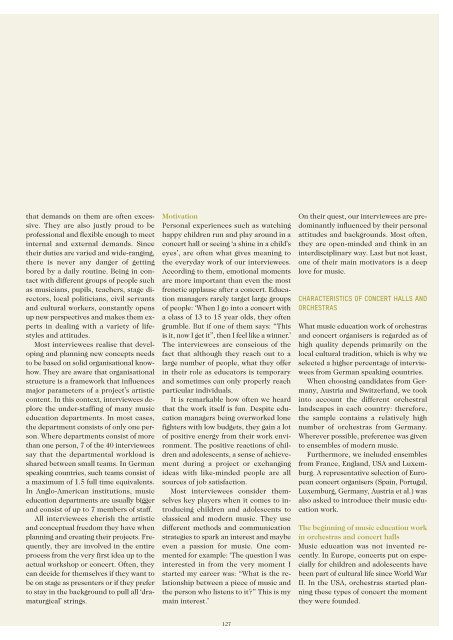exchange die kunst, musik zu vermitteln - Kunstdervermittlung.at
exchange die kunst, musik zu vermitteln - Kunstdervermittlung.at
exchange die kunst, musik zu vermitteln - Kunstdervermittlung.at
Erfolgreiche ePaper selbst erstellen
Machen Sie aus Ihren PDF Publikationen ein blätterbares Flipbook mit unserer einzigartigen Google optimierten e-Paper Software.
th<strong>at</strong> demands on them are often excessive.<br />
They are also justly proud to be<br />
professional and flexible enough to meet<br />
internal and external demands. Since<br />
their duties are varied and wide-ranging,<br />
there is never any danger of getting<br />
bored by a daily routine. Being in contact<br />
with different groups of people such<br />
as musicians, pupils, teachers, stage directors,<br />
local politicians, civil servants<br />
and cultural workers, constantly opens<br />
up new perspectives and makes them experts<br />
in dealing with a variety of lifestyles<br />
and <strong>at</strong>titudes.<br />
Most interviewees realise th<strong>at</strong> developing<br />
and planning new concepts needs<br />
to be based on solid organis<strong>at</strong>ional knowhow.<br />
They are aware th<strong>at</strong> organis<strong>at</strong>ional<br />
structure is a framework th<strong>at</strong> influences<br />
major parameters of a project’s artistic<br />
content. In this context, interviewees deplore<br />
the under-staffing of many music<br />
educ<strong>at</strong>ion departments. In most cases,<br />
the department consists of only one person.<br />
Where departments consist of more<br />
than one person, 7 of the 40 interviewees<br />
say th<strong>at</strong> the departmental workload is<br />
shared between small teams. In German<br />
speaking countries, such teams consist of<br />
a maximum of 1.5 full time equivalents.<br />
In Anglo-American institutions, music<br />
educ<strong>at</strong>ion departments are usually bigger<br />
and consist of up to 7 members of staff.<br />
All interviewees cherish the artistic<br />
and conceptual freedom they have when<br />
planning and cre<strong>at</strong>ing their projects. Frequently,<br />
they are involved in the entire<br />
process from the very first idea up to the<br />
actual workshop or concert. Often, they<br />
can decide for themselves if they want to<br />
be on stage as presenters or if they prefer<br />
to stay in the background to pull all ‘dram<strong>at</strong>urgical’<br />
strings.<br />
Motiv<strong>at</strong>ion<br />
Personal experiences such as w<strong>at</strong>ching<br />
happy children run and play around in a<br />
concert hall or seeing ‘a shine in a child’s<br />
eyes’, are often wh<strong>at</strong> gives meaning to<br />
the everyday work of our interviewees.<br />
According to them, emotional moments<br />
are more important than even the most<br />
frenetic applause after a concert. Educ<strong>at</strong>ion<br />
managers rarely target large groups<br />
of people: ‘When I go into a concert with<br />
a class of 13 to 15 year olds, they often<br />
grumble. But if one of them says: “This<br />
is it, now I get it”, then I feel like a winner.’<br />
The interviewees are conscious of the<br />
fact th<strong>at</strong> although they reach out to a<br />
large number of people, wh<strong>at</strong> they offer<br />
in their role as educ<strong>at</strong>ors is temporary<br />
and sometimes can only properly reach<br />
particular individuals.<br />
It is remarkable how often we heard<br />
th<strong>at</strong> the work itself is fun. Despite educ<strong>at</strong>ion<br />
managers being overworked lone<br />
fighters with low budgets, they gain a lot<br />
of positive energy from their work environment.<br />
The positive reactions of children<br />
and adolescents, a sense of achievement<br />
during a project or exchanging<br />
ideas with like-minded people are all<br />
sources of job s<strong>at</strong>isfaction.<br />
Most interviewees consider themselves<br />
key players when it comes to introducing<br />
children and adolescents to<br />
classical and modern music. They use<br />
different methods and communic<strong>at</strong>ion<br />
str<strong>at</strong>egies to spark an interest and maybe<br />
even a passion for music. One commented<br />
for example: ‘The question I was<br />
interested in from the very moment I<br />
started my career was: “Wh<strong>at</strong> is the rel<strong>at</strong>ionship<br />
between a piece of music and<br />
the person who listens to it?” This is my<br />
main interest.’<br />
127<br />
On their quest, our interviewees are predominantly<br />
influenced by their personal<br />
<strong>at</strong>titudes and backgrounds. Most often,<br />
they are open-minded and think in an<br />
interdisciplinary way. Last but not least,<br />
one of their main motiv<strong>at</strong>ors is a deep<br />
love for music.<br />
CHARACTERISTICS OF CONCERT HALLS AND<br />
ORCHESTRAS<br />
Wh<strong>at</strong> music educ<strong>at</strong>ion work of orchestras<br />
and concert organisers is regarded as of<br />
high quality depends primarily on the<br />
local cultural tradition, which is why we<br />
selected a higher percentage of interviewees<br />
from German speaking countries.<br />
When choosing candid<strong>at</strong>es from Germany,<br />
Austria and Switzerland, we took<br />
into account the different orchestral<br />
landscapes in each country: therefore,<br />
the sample contains a rel<strong>at</strong>ively high<br />
number of orchestras from Germany.<br />
Wherever possible, preference was given<br />
to ensembles of modern music.<br />
Furthermore, we included ensembles<br />
from France, England, USA and Luxemburg.<br />
A represent<strong>at</strong>ive selection of European<br />
concert organisers (Spain, Portugal,<br />
Luxemburg, Germany, Austria et al.) was<br />
also asked to introduce their music educ<strong>at</strong>ion<br />
work.<br />
The beginning of music educ<strong>at</strong>ion work<br />
in orchestras and concert halls<br />
Music educ<strong>at</strong>ion was not invented recently.<br />
In Europe, concerts put on especially<br />
for children and adolescents have<br />
been part of cultural life since World War<br />
II. In the USA, orchestras started planning<br />
these types of concert the moment<br />
they were founded.


